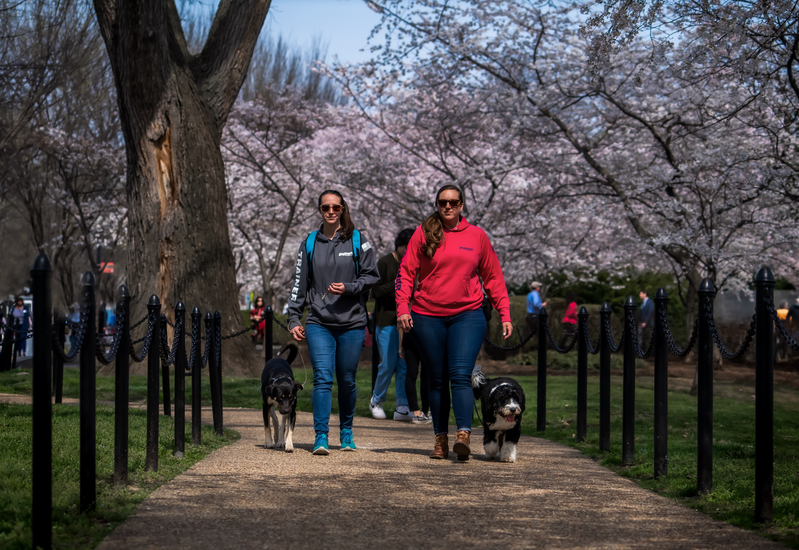Proper Introduction to New People and Environments
If you’re a dog owner, dog and puppy socialisation is an essential aspect of your pet’s life. It involves introducing your dog to new people, noises, and environments. Proper dog and puppy socialisation helps build confidence, develop good behaviour and communication skills, and reduce anxiety in unfamiliar situations. However, socialisation is a delicate process that should be approached with care and attention. In this article, we’ll discuss the importance of dog socialisation, and provide some tips on how to properly introduce your dog to new environments, people, and settings.
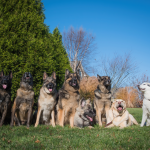
The Importance of Dog and Puppy Socialisation
Socialisation is an essential component of your dog’s development. It helps your pet build self-confidence, develop healthy communication skills, and understand appropriate behaviour in various situations. Socialisation helps your dog become more comfortable and confident in their environment, reducing the risk of anxiety and aggression. Socialisation should start as early as possible, ideally between the ages of three and fourteen weeks. This period is crucial for your dog’s cognitive, behavioural, and social development.
What Dog and Puppy Socialisation Is:
Introducing Your Dog to New Environments
Introducing your dog to new environments is an essential part of socialisation. Exposing your dog to different sights, smells, and noises will help your dog be comfortable in a variety of settings and environments. However, it’s essential to start with less-stimulating environments and gradually increase the level of stimulation. Begin with quiet and calm environments and gradually introduce more stimulating environments. This process should be slow and steady, allowing your dog to become comfortable with each new environment before moving on to the next.
Increasing your dog’s exposure to distracting environments will help with overall obedience, confidence, and stability. If your dog starts to become stressed or anxious in a new environment, go back to the basics and start to build again. Progress is not always a straight line. Build momentum and adjust as needed – this will greatly help with dog and puppy socialisation for the life of your dog. Remember to stay calm and patient and reward your dog for positive behaviour.
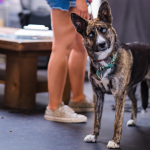
Introducing Your Dog to New People
Introducing your dog to new people is an essential aspect of socialisation. It’s important to expose your dog to a wide variety of people, including children, adults, and seniors. However, it’s essential to approach this process slowly, allowing your dog to get used to each new person before introducing them to someone new. Ensure that the people you’re introducing your dog to are calm and relaxed, and avoid overwhelming your dog with too many people at once.
Only when it’s appropriate, allow your dog to be petted or touched by different people as this will teach your dog to become comfortable with people in safe and acceptable manner. Remember to reward your dog for positive behaviour and monitor their reactions to ensure they’re comfortable with each new person.
Teaching Obedience, Manners, and Proper Greetings
Teaching your dog obedience, manners, and the proper way to greet other dogs and humans is a crucial part of socialisation. Obedience training helps your dog understand commands and develop good behaviour, while teaching proper manners and greetings helps them communicate effectively with other dogs and humans.
What Dog and Puppy Socialisation Is Not:
Coddling or Sheltering Your Dog
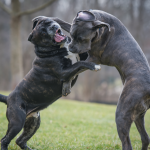
While it’s essential to protect your dog, coddling or sheltering them too much can hinder their socialisation and development. Overprotective behaviour can cause your dog to become anxious, fearful, or aggressive in unfamiliar situations. Therefore, it’s important to balance protecting your dog with exposing them to new environments and situations to develop confidence and good behaviour.
Playing With Other Dogs
Dog and puppy socialisation does not necessarily involve playing with other dogs. While it can be helpful for dogs to interact with other dogs, socialisation is about teaching your dog how to behave appropriately in different situations and around different people. Simply allowing your dog to play with other dogs without guidance can lead to negative behaviors, such as aggression or anxiety, and may not teach your dog how to properly interact with humans or other animals.
Going to Dog Parks or Dog Friendly Establishments
Going to dog parks or dog friendly establishments is not the only way to socialise your dog or puppy. While these places can be great for allowing your dog to interact with other dogs, they can also be overwhelming and stressful for some dogs. Additionally, they may not offer opportunities for your dog to socialise in other important ways, such as exposure to new environments and noises. Socialisation should be a well-rounded process that includes a variety of experiences.
Greeting People or Dogs in an Unsafe Manner
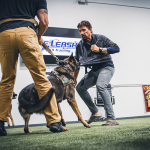
Greeting people or dogs in an unsafe manner is not an acceptable way to socialise your dog. Dogs should be taught how to properly greet people and other animals in a safe and appropriate way. Jumping on people, pulling on the lead, or lunging towards other dogs can be dangerous for both your dog and others. It is important to teach your dog how to properly interact with others to avoid negative experiences that can lead to fear, anxiety, and aggression.
Summary of Things to Do and Things to Avoid with Dog and Puppy Socialisation
Dog and puppy socialisation is about more than just playing with other dogs or going to dog-friendly places. It is about teaching your dog how to behave appropriately in different situations and around different people, as well as providing exposure to new environments and noises. By properly socialising your dog, you can help them lead a happy and well-adjusted life.
Improper dog and puppy socialisation can lead to negative behaviors, fear, anxiety, and aggression, which can be harmful to your dog and those around them. Socialisation is a crucial aspect of your dog’s development, and it’s essential to approach it with care and attention. Introduce your dog to new environments and people slowly, teaching obedience, manners, and proper greetings, and avoid coddling or sheltering your pet too much.
Also avoid taking your dog or puppy to locations or outings they are not ready for or forcing an interaction. Small steps over time yield the biggest improvements. Be patient and create a safe learning environment. Avoid situations that could cause harm or injury to your dog, another dog or person.
At Off Leash K9 Training London, we can help you with all aspects of dog and puppy socialisation.

You can see a variety of dogs we have trained on our YouTube channel. Check out adorable photos and videos on our Facebook page or follow on Instagram.
Our exceptional training and trainers have earned 200+ Google 5-star reviews, which shows our commitment to providing quality training to dogs and their owners.
We hope you’ve enjoyed reading about dog and puppy socialisation tips and found this article useful. Contact us at 0203 890 3400 or customerservice@olk9.co.uk to book your dog’s training session today. To schedule a free phone consultation with one of our professionals, click here to select the date and time that fits your diary best.

